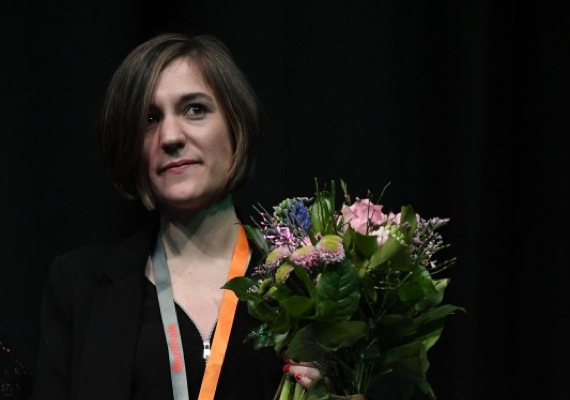Carla Simón • Director
“I learn a lot from the way that children look at film”
- BERLIN 2017: Summer 1993 is the title of Catalan filmmaker Carla Simón’s much-anticipated first full-length feature, screening in Berlin in the Generation KPlus section

Summer 1993 [+see also:
film review
trailer
interview: Carla Simón
film profile], Carla Simón’s full-length debut, was selected two years ago by the Berlinale’s Script Station programme, and last year it took part in the Co-Production Market. The director, who studied in the UK and the USA, gave us the low-down on her latest work.
Cineuropa: Was it a big surprise to be chosen for the Berlinale?
Carla Simón: Yes, it really was. They told us on the 2nd of January, so that was a great way to start off the year. We had a big rush to get the film ready in time, because we filmed it last summer, so we showed them a first editing cut and only later the final film.
It’s a largely autobiographical film, is that right?
The first draft of the screenplay was an amalgamation of my own memories, but I got to the point where I no longer knew what I had made up and what was a genuine memory or something I had been told. But yes, there are some scenes that are exactly as I remember them and many others that are based on certain thoughts or impressions. I lost my mother when I was six years old, and my father had died earlier, when I was very small. The summer of 1993 was my first with a new family: my aunt and uncle and my cousin. So it’s my story, through and through.
I imagine it wasn’t all that easy working with children...
It’s really difficult. Some people ask me what method I used; there’s no method, you just try things out and see what happens... I felt very strongly that the children had to believe in what they were doing, as far as possible, and so we had very long rehearsals with the adult actors to let them spend many hours together playing at being a family, creating that sense of intimacy. The little girls loved playing like that and they never even read the script: I would tell them what was happening in the scene or toss them the line while the cameras were rolling, but it was very difficult to stop them looking at the camera.
As well as addressing the theme of childhood in your short films, you also work on an educational project, Cine en Curso.
Ever since I was 14 years old, I’ve always worked with children in summer schools. Later, when I was studying in the USA, I had a break from it, but in London we set up an organisation to teach children about film. When I came back to Spain I got in touch with Cine en Curso to ask if I could work with them, because I love doing it. I’m a great proponent of theirs because they have a method that works very well and the children get to see films they never otherwise would. Everyone works together, they feel part of it and they learn a lot. I learn a lot from the way that children look at and interpret film.
The team behind Summer 1993 is predominantly female — that’s quite unusual, and we shouldn’t be in the position where it seems like something exceptional...
It was unintentional; it happened naturally. I chose the people I thought would be right for the project and who I was speaking to about working with me. Because I lived in London for a long time, I had no team in Spain, so I had to put one together especially for this film and I didn’t think about gender, it just happened that way. We filmed for six weeks straight, eight hours a day, because the girls didn’t have any more time than that. It was really fast. The casting took a long time, five or six months, and it was difficult because I was looking for someone who would remind me of my younger self. For the character of Frida, it was important to find someone city-born and with a deep inner world, and the very smallest girl had to convey innocence, sweetness and the belief that everything was just fine. Laia Artigas, the oldest, was the last girl we saw, and the role of the youngest went to the only four-year-old who really took to playing with us.
(Translated from Spanish)
Did you enjoy reading this article? Please subscribe to our newsletter to receive more stories like this directly in your inbox.















